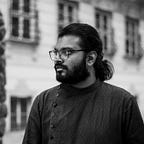Throwback To 2020: Life In Vienna During The Initial Days Of The COVID-19 Pandemic
Read the Bangla version of this article that was published on Unish Kuri.
It was a reasonably chilly February afternoon when I first caught the attention of the sudden rise of COVID 19 cases in Europe as I made my way back home from a fine art event in one of the quintessential Viennese red and white trams. Most of these cases were overwhelmingly being reported from Italy and Spain. Like any other layperson, my initial reactions were a concoction of wishful reasoning, indifference, slight concern, and ignorance. I continued to plan and work on all the assignments and deadlines I had for the upcoming spring and summer months. My attitude was hinging towards being carefree and believing that the virus was “just another flu” with probably slightly more severe symptoms.
However, within a matter of one week, as the number of infected people and the death toll began to rise just across the border in Italy, I finally grasped the reality of the situation and realized that it was just a matter of days before Vienna and other neighboring cities in Central Europe faced the same crisis. By the beginning of the second week of March, Austria started recording many new cases of infection daily, and I had to cancel all my plans for the upcoming months immediately without second thoughts. I started educating myself rigorously on this coronavirus to avoid unwanted panic through misinformation and fake news and arm myself to the teeth in case of the worst. Living halfway across the globe from my family in Kharagpur, it was pretty challenging to fathom and accept this unprecedented crisis and the sweeping changes it would bring in the future, both at a personal and community level.
Austria decided to go into a complete lockdown on 16th March, as the healthcare systems in Italy and Spain were put to the test for the first time since the Second World War. The number of infections rapidly rose across the European Union, prompting the WHO to declare Europe the pandemic’s epicenter. For the first time in my life, I felt completely exposed to a severe crisis, a feeling which I had only imagined partially or grasped by reading newspaper articles on wars and calamities. There was a great hustle on the days leading up to the lockdown in Vienna, with people hoarding food, medical, and other essential supplies like toilet paper and sanitizers. I, too, had to rush to multiple stores and secure basic supplies as not enough guidelines were available in English in the initial days. There was an eerie feeling that it was the silence before the storm- an impending natural disaster or war-like aggression. The government was swift to tackle this problem within a matter of days by ensuring smooth and unhindered supplies and providing detailed information in English to the expatriate community on their official website.
The quarantine days have been very stressful for me like billions of others around the globe, worrying about the human cost of this pandemic, possible shapes and forms of the job market for young graduates like myself, and their long-term psychological impact. Amidst all this negativity, the only silver lining from my quarantine has been the rediscovery of latent interests I have had, ranging from cooking various meals to experimenting with various forms of sketching. I humbly acknowledge my privilege to be able to indulge in these activities. An interesting observation arising out of being locked in the same apartment building for weeks together in this period has been the growing sense of belonging to this city and my neighborhood, which I never felt before as a foreign student. It is a life-long bond that I will carry into my old age.
The strict lockdown measures were relaxed earlier this week, and further restrictions would be lifted by the end of April. Being the first country in Europe to flatten the curve, the authorities in Austria aim to put the country back into much-needed economic normalcy by the middle of May. It seems for the moment that the initial cannonball has been dodged as deafening silence and apocalyptic scenes of deserted streets continue to loom large over the breakfast servings of apple tarts and melange coffee in Vienna. If the current levels of precautions and alertness are not maintained, the virus might regain strength again and cause another wave of casualties. The historian in me hopes that the city will overcome this dark chapter like it repeatedly did in the past in the events of the Mongol threats, the Ottoman sieges, the Spanish Flu pandemic, and the horrors leading up to and during the Second World War. And I cannot help but wonder how in these days of fighting the coronavirus, Mozart would have composed a string quartet, Klimt would have painted, and Freud would have psychoanalyzed his patients
